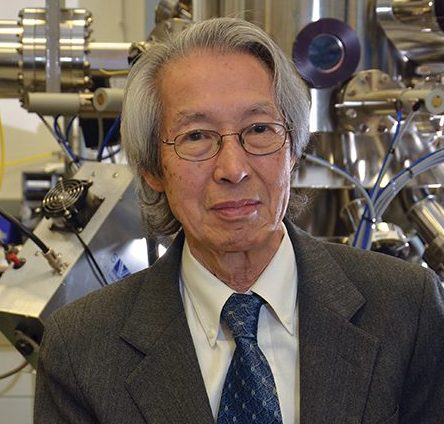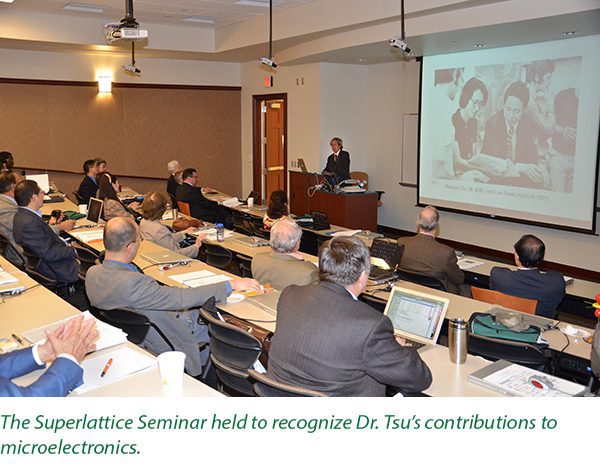Dr. Ray Tsu, UNC Charlotte’s “Superlattice Man” Retires

Having helped establish UNC Charlotte as a research university for the past 25 years, Dr. Ray Tsu, the “Superlattice Man”, is retiring. Not one to stop working or contributing completely, though, Dr. Tsu will begin three years of phased retirement in spring 2013, after which he says he still plans to provide consulting for university research.
In recognition of his stepping down, the university’s Optoelectronics and Optical Communications Center held a two-day seminar, May 6-7, to honor Dr. Tsu’s accomplishments. The seminar was not just about the past, however, as top experts in the field of microelectronics came together to discuss Dr. Tsu’s research and its future development.
Prior to his career at UNC Charlotte, Dr. Tsu worked for several years at the world famous Bell Laboratories at Murray Hill, New Jersey, developing the ultrasonic amplifier. From there he moved to the IBM, T.J. Watson Research Center in New York where began his well-known collaborations with Dr. Leo Esaki, working on the theory of man-made quantum materials, quantum wells and superlattices.
By his theoretical calculations, Dr. Tsu proved that quantum states can be designed in multiple layers of semiconductors in a superlattice structure. A superlattice is a structure consisting of alternating layers of two different semiconductor materials, each several nanometers thick. Dr. Tsu provided the basic theory of negative differential conductance applicable to the man-made Superlattice, and he then achieved tunneling through the double-barrier structure. These results formed the forerunner of today’s nanoelectronics. Dr. Tsu had become the “Superlattice Man”.
As a distinguished professor of electrical engineering, Dr. Tsu’s arrival marked the start of world-class engineering research at UNC Charlotte. With other prominent researchers who joined to the university at that time, UNC Charlotte was on its way to becoming a research intensive university.
UNC Charlotte colleague Dr. Mike Fiddy, a professor of physic and optoelectronics, says of Dr. Tsu: “Ray Tsu is an exceptional talent. His deep physical insights and strong theoretical and experimental skills have led to a large number of ‘firsts’ in the field of semiconductor physics and engineering. His encyclopedic knowledge and strong intuition have influenced the thinking of many generations of scientists, including a significant number of Nobel Laureates. This work launched a still expanding field of engineered man-made materials with remarkable electronic and photonics properties that continues to fuel next generation components and devices.”
Dr. Ian Ferguson, chairman of the Lee College of Engineering’s Electrical and Computer Engineering Department, says of Dr. Tsu: “Ray’s contributions to research at UNC Charlotte have been the intellectual backbone of the university. His presence here brought instant recognition to the university as a major player in electronics research. A testament to Ray’s legacy is that to celebrate his career, a three-day workshop of the world’s leading experts in superlattice research, both past and future, was held at UNC Charlotte in May. And you can be sure that Ray participated fully in all discussions and disagreements.”

In summing up his own career, Dr. Tsu said “I’ve always been fundamentally interested in the structure of human ingenuity. I’m grateful UNC Charlotte has tolerated me over the years. I hope I can continue to serve in some type of advisory capacity to the university. All in all, I think I did the best that I could.”